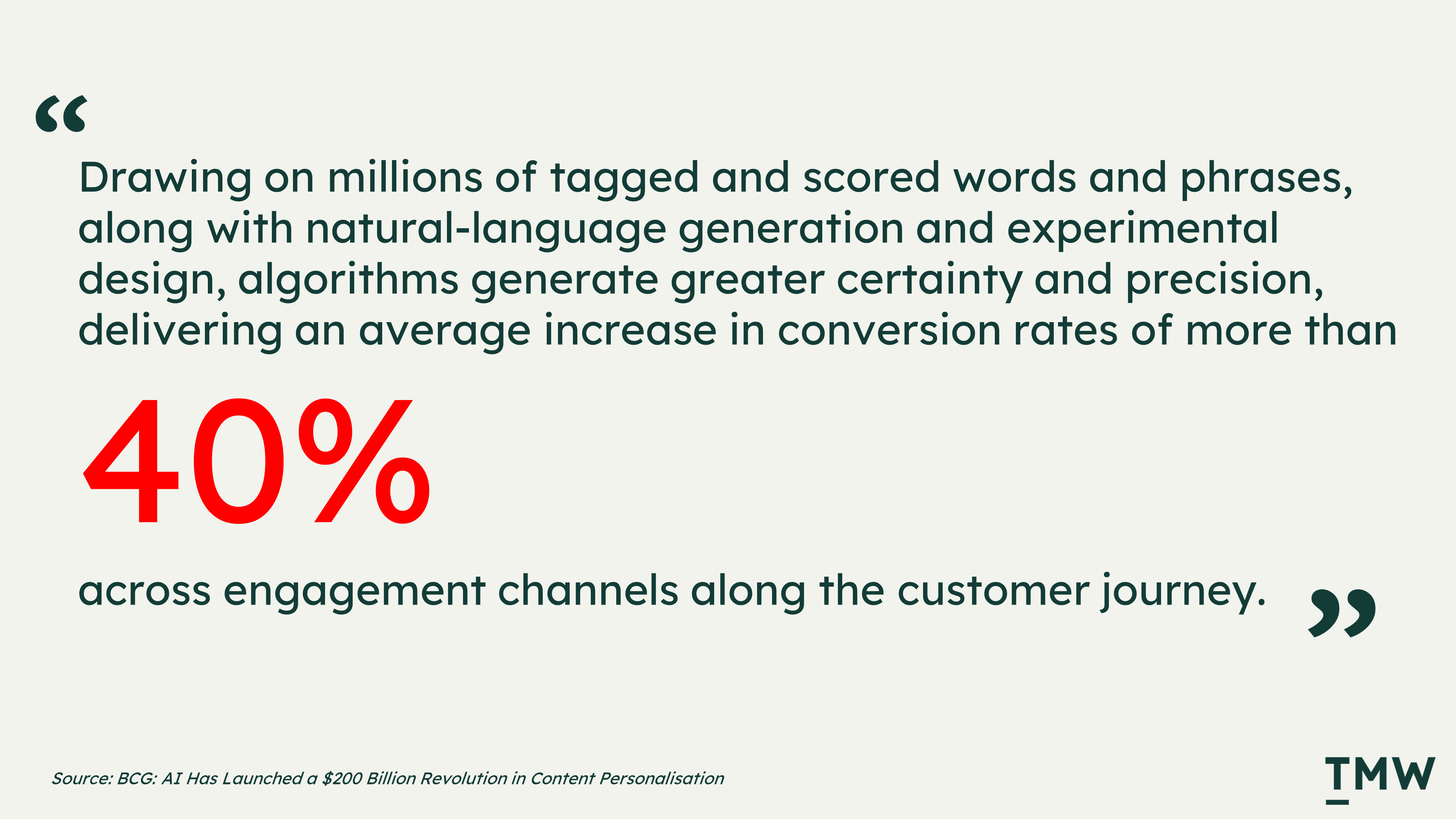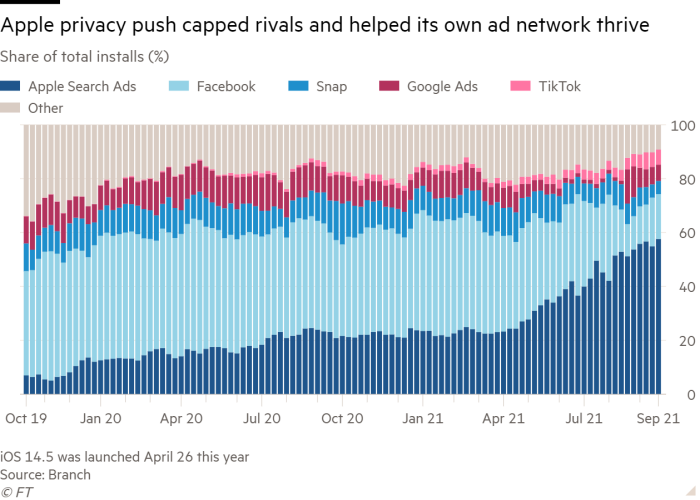TMW #060 | The hard problem of personalization, Apple’s ad business, and legislating digital identity.
Welcome to The Martech Weekly, where every week I review some of the most interesting ideas, research, and latest news. I try to look to where the industry is going and make sense of it all.
👋 Why you should sign up
TMW is the quickest and easiest way to stay ahead of the Martech industry. Sign up to get the full version delivered every Sunday for this and every TMW, along with an invite to the TMW community. Learn more here.
👋 Hello and welcome to new subscribers from France, Croatia, The UK, India, Australia, and the USA! Know someone who only speaks in acronyms? Send them this link.
Welcome to TMW #060. Before we start I have two things for you:
🤩 Thank you to the 30+ people who joined the TMW Plus builders list last week. If you missed it, I announced there will be a premium version of TMW in early 2022, but I want you to tell me what it should look like. More info here.
📣 A new episode of the MSoM Podcast is up. I talk with Tessa Court, the CEO of Intelligencebank on the place of process in marketing creativity. Listen
Here’s the week in Martech:
- The hard problem of personalization: A personalization strategy sounds great until you realize you’ll need hundreds or thousands of content versions to pull it off. BCG thinks that AI is the solution. I disagree.
- Apple’s ad business is booming after cutting off other major iOS app advertisers from data collection. Privacy can make a lot of commercial sense when you’re Apple.
- Digital identity legislation: Australia is proposing a framework for managing digital identities and the US is pushing for a national cloud infrastructure. Why?
- Everything else: Shopify and Spotify partnership, Bacefook, Pinterest and Paypal, the end of SaaS, bad briefs, Martech = $344.8 billion industry? The CDP marketplace in 2021, brand as a business utility, the attention metric, and revenge spending.
✍ Commentary
The hard problem of personalization. Have you ever asked a marketing team to create 6,000 versions of the same banner image? I could tell you what would likely happen, but it wouldn’t be pretty. The request sounds absurd, but the reality for digital leaders is that personalizing things for customers requires huge efforts on a content front, draining resources and chewing up budgets for returns that are challenging to realize. This is what I call the hard problem of personalization - to make it really personal, you need hundreds or even thousands of versions of content, messages, or offers, and nobody has time for that.
Boston Consulting Group is predicting that artificial intelligence will be a catalyst in solving this problem. The consulting firm last week released a forecast suggesting that AI-enabled content generation could create more than $200 billion in incremental revenue for Fortune 500 companies and $800 billion for the entire market. This is a big bet, but I don’t think this forecast is even close to reality, and here’s why.
Artificial intelligence in the realm of content generation faces the same machine-to-human problem as autonomous driving. We already have AI-trained personalization in the market, and autonomous cars are already on the road, but both of them are yet to replace the status quo. Marketers are still doing manual targeting, and you can’t go out and just buy a fully autonomous vehicle without a steering wheel. And there’s a reason for this.
Artificial intelligence requires an ability to deal with the irrationality of other humans in sometimes life or death situations. That’s why you can’t buy an autonomous car and why I think the premise for AI content generation is fundamentally flawed.
Don’t get me wrong, AI content generation is already here, with brands like the pencil and copy.ai growing quickly. These are companies that use GPT-3 or similar ML programs to generate content for you based on what information you feed it. I even received an AI-generated ad this week (which had an absolutely atrocious grammatical mistake in it). Looking more broadly, it’s hard to find a marketing automation or optimization platform that doesn’t offer some form of AI feature set (even if it’s just a rules-based decision tree in disguise). The demand causing this market movement represents what I call the third paradigm in content operations, from manual → automated → intelligent.
So there’s clearly a problem to solve here which is this - there are not enough human hours to produce versioned content for large-scale personalization strategies. Customers apparently want their interactions personalized for them (according to Smart HQ), and artificial intelligence appears to be the way to solve it, which causes global consulting firms like BCG to say stuff like this:

But the hard problem in personalization persists. Marketers turn up to their jobs every day to be creative and solve problems. To hand over most of that creativity to an artificially intelligent content generation machine is more than outsourcing and automating. It’s also handing over your reputation, revenue targets, and ultimately your career.
That’s why many of the use cases for AI content generation may not really get past the first hurdle. And the reason is simple: There’s too much risk in it. It may not be life and death situations as with automated driving, but the risks involved with AI content generation are unique. There will be a real person experiencing whatever the AI program decides, and at scale there won’t be a marketer to approve messages, opening up brands to legal exposure and potentially embarrassing Twitter posts.
A funny example is the persistent complaints I hear of chatbots. It’s clear by now that the technology is obviously failing with most use cases, creating vicious interaction loops for customers, and making people turn to social media to vent their frustrations when even more complexity is added to a high-stakes brand interaction. Yet somehow, brands still use them but limit the potential impact and usability of these tools. We’ve had chatbots on almost every channel for almost a decade now, and still, they are terrible. Why might you ponder? Marketers can’t fully trust them.
This is why despite the demand for personalization from customers, and marketers wanting to make it happen, the hard problem of personalization can’t be solved fully through artificial intelligent content generation. If we can’t trust our cars to not kill someone, can we trust it enough to not get us fired? Links: BCG forecast. Analysis. Chatbots. Personalisation demand.
📈Chart Of The Week
Apple’s privacy imperative is very good for their ad business. Back when Apple introduced the ATT for iOS and limited what data brands can collect and use on consumers a few months ago, few challenged the move as a strategic play for Apple’s own advertising business. Reporting from the Financial Times now confirms this. 58% of iPhone app downloads result from an Apple advertisement, up significantly since the start of the year. Privacy is great, but have you ever tried to cut off all competitors to grow your own ad business? Links: FT reporting.Analysis. Broader impacts.Facebook response.

📰 Latest Developments
Digital identity legislation. The Australian government has announced their plan to create a national digital identity framework and is recommending that the nation adopts cryptocurrencies, and even (!) set up their own DAO. Outside of this there’s a growing push in the United States for a national cloud program. A lot of this will augment how companies deal with consumers online with changes coming from all angles. Link: Identity legislation. Australia’s DAO. National research cloud.
Shopify and Spotify. The world’s largest eCommerce and music streaming companies have announced an official partnership to integrate purchasing within the Spotify platform. Streaming services are going in the same direction as social networks - they are increasingly becoming marketplaces in their own right. And the payments and operations infrastructures of the web are quickly moving into this area. Link (also see the potential Paypal acquisition of Pinterest, many of the same patterns here, a topic I’ll be commenting on next week).
Cheetah Digital and Campaign Monitor. The two companies have announced a surprising merger. There are now many players in the marketing automation and loyalty space, and one way to compete is to bring together capabilities and focus resources. In a way, it reminds me of the Twilio and Segment acquisition - different use cases and customers between them, but to compete, joining forces makes more sense than not. The great Martech consolidation continues….. Link
Other noteworthy items: Facebook’s name change (Please let it be BaceFook), and Trump’s social media platform has already gone public.
📚 Reading
The end of SaaS. The Napkin Math newsletter on the death of the SaaS category as we know it. The concept wraps around the idea that Salesforce really started the industry properly by championing cloud and browser-based software. Now that the space has matured, everyone wants to go further up the chain to enterprise and will get disrupted by new user patterns while doing so. Link
Platform vs products. The best-of-breed conversation in Martech is fascinating. There are the platforms and marketing suites that shoehorn everything under one logo, and then there are companies that focus on integrating many products together. The next installment in this conversation is here. Link
Bad briefs. Marketers are apparently really bad at writing briefs, costing brands billions of dollars. It’s because many aren’t trained to write a really good brief for their creative or technology teams. Link (Thank you to a colleague, Gina for sharing this!)
🔢 Data & Insights
Deloitte on customer engagement. Customers are revolting at the prospect of seeing ads on social media based on what they’ve browsed online. But are happy to know about sales and discounts in real-time. Link
Is the Martech industry worth $344.8 billion? The Martech Alliance thinks so. Link
The CDP marketplace (2021 version). The category is maturing fast. These new definitions of CDP categories now make a lot more sense. Knowing if a CDP is suite dependent or not is helpful, but so is figuring out if a vendor is engagement or processing oriented in their technology. Link
💡 Ideas
Brand as a business utility. Brand value as a concept is intangible, and because of this businesses seem to disregard that millions or billions of people can recite a jingle or can recall a brand logo. This analysis into explaining the value of brand in the context of business performance is a good start. Link
The attention metric. Dentsu has said they have invented a new advertising metric focused on attention. Don’t worry it’s not just another sales tactic or way to obfuscate performance reporting. It’s a sincere effort to differentiate between a content view, and proper human contemplation. Link (Pairs well with this research report)
Fixing the news algorithm. A $2 billion Japanese startup is thinking about ways to get news outside of the mainstream social media news feeds. It’s kind of like an independent version of Apple News, but better. Link
✨ Weird and Wonderful
WFH the newsletter. An entire newsletter dedicated to showcasing people’s work from home desk setup. Strangely soothing. Link
Microdosing on LSD to get your job done. Welcome to 2021 where major industry publications are advocating that agency folks just start using drugs to manage the demands of the job. Pure insanity. Link
Revenge spending. Link
Stay Curious,
Make sense of marketing technology.
Sign up now to get the full version of TMW delivered to your inbox every Sunday afternoon plus an invite to the slack community.
Want to share something interesting or be featured in The Martech Weekly? Drop me a line at juan@themartechweekly.com.
